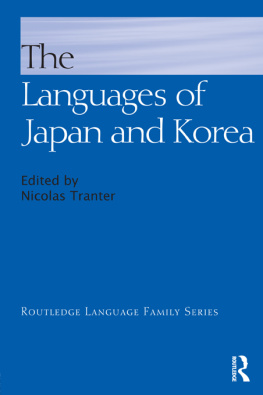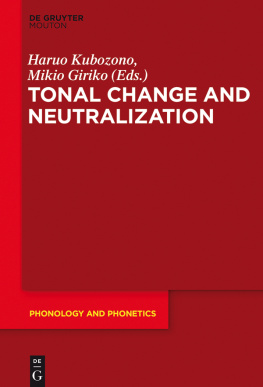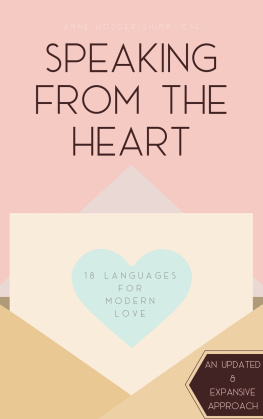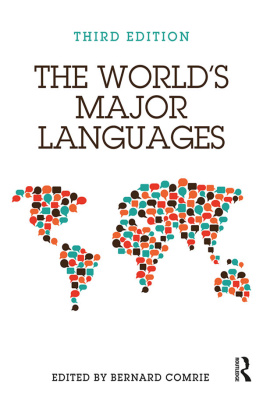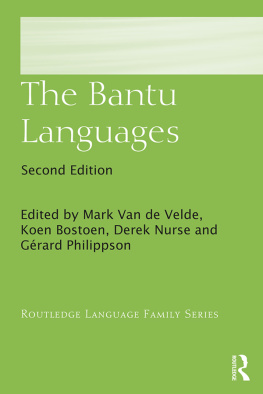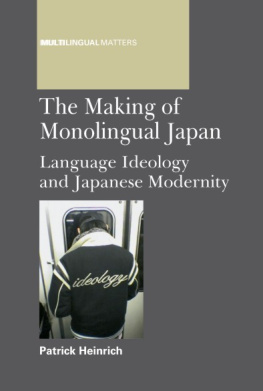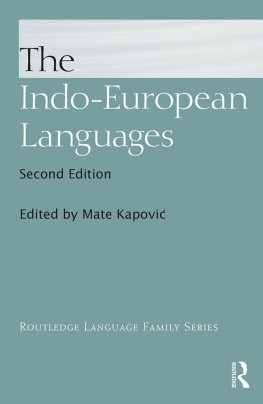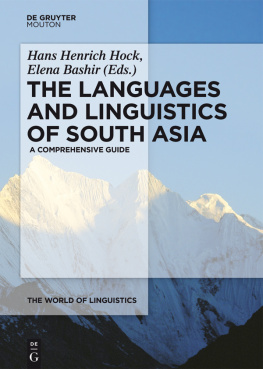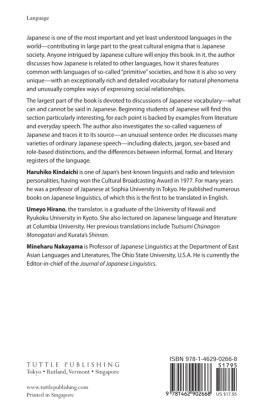
THE
LANGUAGES OF
JAPAN AND KOREA
The Languages of Japan and Korea provides detailed descriptions of the major varieties of languages in the region, both modern and pre-modern, within a common format, producing a long-needed introductory reference source. Korean, Japanese, Ainu, and representative members of the main groupings of the Ryukyuan chain are discussed for the first time in great detail in a single work.
The volume is divided into language sketches, the majority of which are broken down into sections on phonology, orthography, morphology, syntax and lexicon. Specific emphasis is placed on aspects of syntactic interest, including speech levels, honorifics and classifiers. Each language variety is represented in Roman-based transcription, although its own script (where there is such orthography) and IPA transcriptions are used sparingly where appropriate. The dialects of both the modern and oldest forms of the languages are given extensive treatment, with a primary focus on the differences from the standard language. These synchronic snapshots are complemented by a discussion of both the genetic and areal relationships between languages in the region.
With contributions from a variety of scholars of the highest reputation, The Languages of Japan and Korea is a much needed and highly useful tool for professionals and students in linguistics, as well as area studies specialists.
Nicolas Tranter is Lecturer at the University of Sheffield, teaching courses on East Asian languages and linguistics.
ROUTLEDGE LANGUAGE FAMILY SERIES
Each volume in this series contains an in-depth account of the members of some of the worlds most important language families. Written by experts in each language, these accessible accounts provide detailed linguistic analysis and description. The contents are carefully structured to cover the natural system of classification: phonology, morphology, syntax, lexis, semantics, dialectology, and sociolinguistics.
Every volume contains extensive bibliographies for each language, a detailed index and tables, and maps and examples from the languages to demonstrate the linguistic features being described. The consistent format allows comparative study, not only between the languages in each volume, but also across all the volumes in the series.
The Austronesian Languages of Asia and Madagascar
Edited by Nikolaus Himmelmann & Sander Adelaar
The Bantu Languages
Edited by Derek Nurse & Grard Philippson
The Celtic Languages 2nd Edition
Martin J. Ball & James Fife
The Dravidian Languages
Edited by Sanford B. Steever
The Germanic Languages
Edited by Ekkehard Konig & Johan van der Auwera
The Indo-Aryan Languages
Edited by George Cardona & Dhanesh K. Jain
The Indo-European Languages
Edited by Paolo Ramat & Anna Giacalone Ramat
The Iranian Languages
Edited by Gernot Windfuhr
The Khoesan languages (forthcoming)
Edited by Raner Vossen
The Languages of Japan and Korea
Edited by Nicolas Tranter
The Mongolic Languages
Edited by Juha Janhunan
The Munda Languages
Edited by Gregory D.S. Anderson
The Oceanic Languages
Edited by John Lynch, Malcolm Ross & Terry Crowley
The Romance Languages
Edited by Martin Harris & Nigel Vincent
The Semitic Languages
Edited by Robert Hetzron
The Sino-Tibetan Languages
Edited by Graham Thurgood & Randy J. Lapolla
The Slavonic Languages
Bernard Comrie & Greville G. Corbett
The Tai-Kadai Languages
Edited by Anthony Diller
The Turkic Languages
Edited by va Csat & Lars Johanson
The Uralic Languages
Edited by Daniel Abondolo
THE
LANGUAGES OF
JAPAN AND KOREA
Edited by
Nicolas Tranter

First published 2012
by Routledge
2 Park Square, Milton Park, Abingdon, Oxon OX14 4RN
Simultaneously published in the USA and Canada
by Routledge
711 Third Avenue, New York, NY 10017
Routledge is an imprint of the Taylor & Francis Group, an informa business
2012 Nicolas Tranter, selection and editorial matter; individual chapters, the contributors
The right of the editor to be identified as the author of the editorial material, and of the authors for their individual chapters, has been asserted in accordance with sections 77 and 78 of the Copyright, Designs and Patents Act 1988.
All rights reserved. No part of this book may be reprinted or reproduced or utilised in any form or by any electronic, mechanical, or other means, now known or hereafter invented, including photocopying and recording, or in any information storage or retrieval system, without permission in writing from the publishers.
Trademark notice: Product or corporate names may be trademarks or registered trademarks, and are used only for identification and explanation without intent to infringe.
British Library Cataloguing in Publication Data
A catalogue record for this book is available from the British Library
Library of Congress Cataloging in Publication Data
The languages of Japan and Korea / edited by Nicolas Tranter.
p. cm. (Routledge language family series)
1. Ryukyu islandsLanguages. 2. Japanese languageGrammar. 3. Korean languageGrammar. 4. JapanLanguages. 5. KoreaLanguages. I. Tranter, Nicolas.
PL693.R9L36 2012
495.67dc23
2011037313
ISBN: 978-0-415-46287-7 (hbk)
ISBN: 978-0-203-12474-1 (ebk)
Typeset in 9.5/11pt Times New Roman
by Graphicraft Limited, Hong Kong
CONTENTS
ILLUSTRATIONS
FIGURE
TABLES
CONTRIBUTORS
John R. Bentley is in the Department of Foreign Languages and Literatures at Northern Illinois University, USA.
Anna Bugaeva is at Waseda Institute for Advanced Study, Waseda University, Japan.
Mark Irwin is at the Faculty of Literature and Social Sciences, Yamagata University, Japan.
Atsuko Izuyama was formerly at Dokkyo University, Ska, Saitama, Japan.
Young-Key Kim-Renaud is at the East Asian Languages and Literatures Department, The George Washington University, USA.
Mika Kizu is in the Department of Languages and Cultures of Japan and Korea, School of Oriental and African Studies, University of London, United Kingdom.
Wayne P. Lawrence is at the School of Asian Studies, The University of Auckland, New Zealand.
Akiko Matsumori is at the School of Humanities, Japan Womens University, Tokyo, Japan.
Heiko Narrog is at the Graduate School of International Cultural Studies of Tohoku University, Sendai, Japan, and is also an invited associate professor at the National Institute for Japanese Language and Linguistics (NINJAL).
Nam Pung-hyun is emeritus professor at the University of Dankook, Republic of Korea, and is a former president of the Society for Kugyl Studies.
Takuichiro Onishi is at the National Institute for Japanese Language and Linguistics (NINJAL), Tachikawa City, Tokyo, Japan.
Mark Rosa is a doctoral student at Tokyo University, Japan.
Michinori Shimoji is at Gunma Prefectural Womens University, Japan, and is also an invited associate professor at the National Institute for Japanese Language and Linguistics (NINJAL).
Ho-min Sohn is at the Department of East Asian Languages and Literatures, University of Hawaii at Mnoa, USA.
Next page
